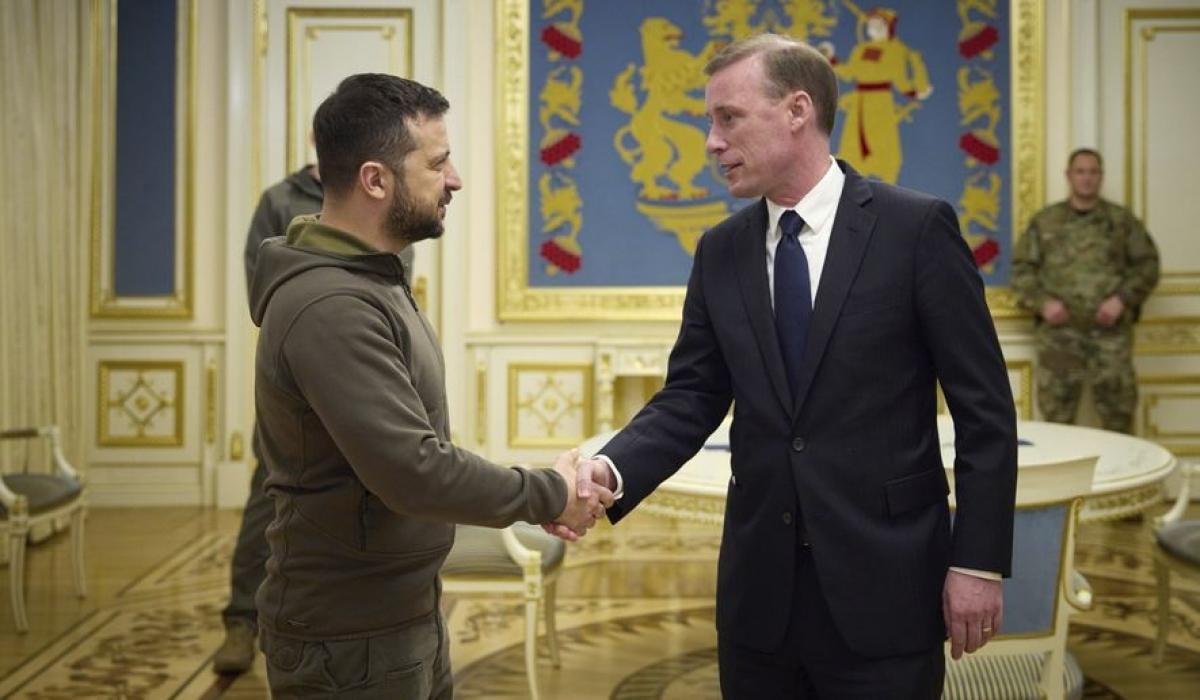Behind the US push for Ukraine to show goodwill in negotiations with Russia
Washington appears to have shifted its stance on the Russia-Ukraine conflict, with the chairman of the US Joint Chiefs of Staff urging talks before the start of winter, while US national security advisers conduct behind-the-scenes talks with Russia.
Over the past few months, there has been speculation in the West that the administration of US President Joe Biden will shift policy in favor of peace talks after themidterm elections“The end,” said David T. Pyne, a former US Department of Defense official and now a scholar at the EMP Task Force.
“Reports suggest that the Biden administration was wary of engaging in peace talks before last week’s midterm elections for fear of risking a major defeat for his party, including losing both houses of Congress,” Pyne said.
 |
US National Security Adviser Jake Sullivan meets with Ukrainian President Volodymyr Zelensky, during a visit to Kiev on November 4, 2022. Photo: Office of the President of Ukraine/AP |
With the US midterm elections looming, “the timing is right for a major diplomatic initiative to negotiate a peace deal” with Moscow to end the Russia-Ukraine conflict, Pyne said.
On November 10, the New York Times revealed that General Mark A. Milley - Chairman of the Joint Chiefs of Staff, suggested that it was time for Ukraine to "strengthen their interests" at the negotiating table with Russia before winter began.
Meanwhile, US National Security Adviser Jake Sullivan has confirmed contact with Moscow. Mr. Sullivan also visited Kiev earlier this month.
On November 5, the Washington Post revealed that the Biden administration issecretly asked Ukraine to show its readiness to negotiate with Russia. At the same time, the US media also said that the request by Washington officials was a calculated effort to ensure that Ukraine could maintain the support of other countries. The US press also acknowledged that these unclear discussions showed how complicated the White House's stance on Ukraine had become.
Notably, Ukrainian President Volodymyr Zelensky suddenly showed a clear change of heart by declaring that he was ready to negotiate with Russia, although he had refused to consider this possibility for many months.
“Some sources have speculated that the administration’s latest peace initiative may be less pragmatic and more of a peace posture to secure support from America’s European allies like France and Germany, who have been keen to pursue a negotiated deal for months,” Pyne said.
The former Pentagon official did not rule out the possibility that Italy, France and Germany may be pursuing a diplomatic option behind the scenes to end the conflict in Ukraine amid the burgeoning energy crisis. However, he also highlighted the fact that the three major EU countries have “repeatedly stated that they will continue to provide military support to Ukraine in the hope that Kiev can push the Russian army back to its positions before February 24.”
Earlier this week, Hungary blocked an €18 billion EU aid package for Ukraine, drawing criticism from the bloc’s leaders. Meanwhile, Europeans have held protests across the bloc calling on their governments to stop sending arms to Kiev and lift sanctions on Russia.
Majority of Americans oppose continued military aid to Ukraine
According to Mr. Pyne, the economic crisis in Western countries and especially the economic recession in the US "has certainly increased the pressure on the Biden administration and members of Congress, forcing them to be more open to supporting peace negotiations between Ukraine and Russia."
Recent polls also show that more than half of Americans want an end to the Russia-Ukraine conflict.
“A number of recent polls show that a majority of Americans have shifted their views to oppose continued military aid to Ukraine, with 52% saying they agree that Ukraine lost the war. Other polls show that the American public is divided on whether Washington should continue to support Ukraine in its fight against Russia,” Pyne said.
The Republican Party (GOP) is now expected to take control of the House of Representatives. Previously, Republican Representative Kevin McCarthy - who could become Speaker of the House if the GOP controls the chamber - announced that he would support cutting aid to Kiev.
“Moreover, there is a growing ‘America First’ wing of the Republican Party in the House of Representatives, who understand that military aid to Ukraine is contrary to US national security interests because it increases the risk of a war between the US and Russia as well as the possibility of Russian nuclear escalation,” Pyne said.
Is the “peace” signal from Washington just for domestic public opinion?
Still, it remains unclear how serious the current US administration is about supporting a negotiation to end the conflict between Russia and Ukraine, according to Mr. Pyne.
He noted that the Biden administration has said it would support any concessions the Ukrainian government agrees to as part of a peace deal with Russia. However, Kiev has repeatedly stressed that it will not accept the results of the referendums in Donetsk, Lugansk, Zaporizhzhia and Kherson, as well as their subsequent annexation to the Russian Federation. This issue could become a barrier to potential future negotiations.
On the other hand, the new peace initiative of the US administration could be a domestic situation aimed at appeasing the radical wing of the Democratic Party in the House of Representatives, which had previously sent a letter to President Joe Biden calling on him to mediate.peace negotiationsbetween Kiev and Moscow.
“One of the reasons for the timing of this peace initiative could be to help ensure progressive support for Biden’s $50 billion aid package during the “lame-duck” congressional session, the former US Defense Department official said./.
